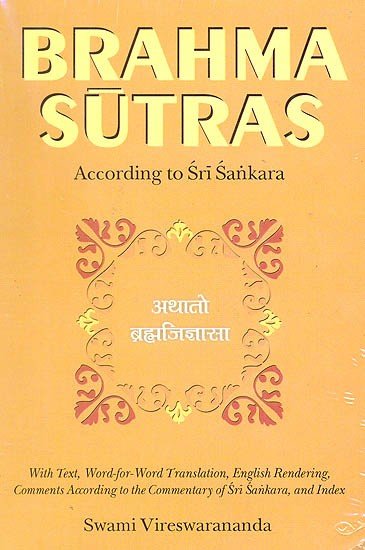Brahma Sutras (Shankara Bhashya)
by Swami Vireshwarananda | 1936 | 124,571 words | ISBN-10: 8175050063
This is the English translation of the Brahma-sutras including the commentary (Bhashya) of Shankara. The Brahma-sutra (or, Vedanta-sutra) is one of the three canonical texts of the Vedanta school of Hindu philosophy and represents an early exposition the Vedantic interpretation of the Upanishads. This edition has the original Sanskrit text, the r...
Chapter II, Section III, Adhikarana IX
Adhikarana summary: The mention of the mind, intellect, and organs
Adhikarana IX - The mention of the mind, intellect, and organs does not interfere with the order of creation and reabsorption, as they are the products of the elements.
Brahma-Sutra 2.3.15: Sanskrit text and English translation.
अन्तरा विज्ञानमनसी क्रमेण तल्लिङ्गादिति चेत्, न, अविशेषात् ॥ १५ ॥
antarā vijñānamanasī krameṇa talliṅgāditi cet, na, aviśeṣāt || 15 ||
antarā—In between; vijñānamanasī—intellect and mind; krameṇa—in the order; talliṅgāt—owing to indication of that; iti cet—if it be said; na—not so; aviśeṣāt—on account of non-difference.
15. If it be said that in between (Brahman and the elements) the intellect and the mind (are mentioned, and therefore that ought to be the order in creation and the inverse order in reabsorption), owing to the indication (in the Sruti texts) to that effect (which upsets the order of creation of the elements), (we say) not so, on account of the non-difference (of the intellect and the mind from the elements).
In the Mundaka Upanishad occurs the following text, “From this Self are produced Prana, mind, the senses, ether, air, fire, water, and earth, the support of all” (2. 1. 3). An objection is raised that the order of creation is as described in this text, which contradicts the order of creation of elements described in the Chhandogya 6. 2. 3 and other Srutis. This objection is here refuted on the ground that the Mundaka text only states that all these are produced from the Self, but gives no order of creation like the other texts. Again the intellect, mind, and organs are effects of the elements, and so they can come into existence only after the elements are created. On account of this non-difference of the organs from the elements, their origination and reabsorption are the same as those of the elements. That the organs are modifications of the elements is proved by Sruti texts like, “For the mind, my child, consists of earth, the vital force of water, the vocal organ of fire” (Chh. 6. 6. 5). Therefore the Mundaka text does not upslt the order of creation mentioned elsewhere.
